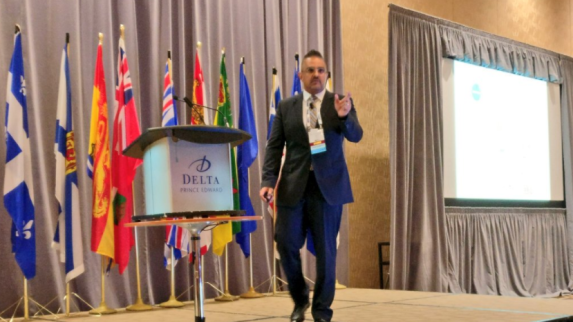
(This is the first of a planned irregular series of interviews with Canadian physicians who are regular users of social media)
Almost four years ago, Dr. Ali Jalali (@ARJalali) uploaded a video for the Royal College of Physicians and Surgeons of Canada dealing with the value of social media for physicians and how to get started. With more than 2,600 viewings it has hardly gone viral but in many ways it set out the rationale and standards for the professional use of social media by Canadian doctors.
Since making that video, Dr. Jalali has arguably become the leading Canadian academic physician when it comes to professional use of social media by physicians and has published several papers and studies with a special focus on the impact of social media on medical education and its use by medical students and residents.
I recently visited Dr. Jalali in his office at the University of Ottawa where he serves as director of the division of functional and clinical anatomy and we discussed the evolution in the use of social media by Canadian physicians over the past four years.
Despite the fact that use of social media remains static with only 5%-10% of Canadian physicians using channels such as Twitter for professional purposes, Dr. Jalali believes social media has become much better accepted within the profession.
“I don’t think the idea was to get more and more doctors on social media,” he said, “but rather to make them more aware of what social media is.” With more patients using social media and posting queries for physicians, he said, it was important to make physicians aware of how to deal with these interactions.
“We managed to open the discussion,” he said.
As a turning point in Canada, Dr. Jalali points to a 2014 publication by the Canadian Medical Protective Association (CMPA) – the organization that provides malpractice support for physicians – which acknowledged the reality of social media in medical practice.
“Whether doctors choose to engage in social media or not, they cannot ignore the implications,” CMPA CEO Dr. Hartley Stern wrote at that time.
Dr. Jalali said this was a huge change from the earlier stance of CMPA as being totally opposed to physicians having anything to do with social media.
“That gave a huge boost to our work in promoting the use of social media by physicians. It’s not as exclusive as it was.”
Dr. Jalali also talked about how pervasive social media has become in medical education and medical conferences with every conference now having a specific hashtag and making conscious efforts to have delegates engage in social media.
Despite some anachronistic attempts by the organizers of some medical conferences to still prevent people live tweeting, Dr. Jalali said an intelligent social media presence is now a reality in medical education and this has immensely benefited those unable to attend major conferences in person.
“In medical education, it has now become part of the conference.”
Dr. Jalali said he continues to advocate professional behavior by physician delegates at these meetings. “If someone had the conference says don’t tweet my stuff, you shouldn’t tweet their stuff. It’s as simple as that.”
Dr. Jalali also pointed to the incredibly active social media debate and discussion around the Ontario Medical Association and its interactions with the provincial government as well as its own internal politics as another indicator of the growth in influence of social media.
“The younger generation is saying I can use this tool to my advantage.”
Despite this growth, he said it remains uncertain whether social media has actually done anything to improve health outcomes or the health status of the public as a whole.
For his own part, Dr. Jalali took a conscious break from social media earlier this year when he took paternity leave. He said this was a very positive move which made him realize how important it is for the purpose of wellness and personal relationships to maintain a balanced approach to social media use.
“It definitely was a good thing to do.”
He has now returned to use of Twitter and other social media tools but acknowledged he is not as active as it was.
Dr. Jalali says in talking to students and residents about social media now in addition to discussing professional use, he also talks about wellness and how to manage time properly by not letting social media dominate one’s life.
“FOMO – the Fear of Missing Out – is real,” he said, and must be consciously addressed.
(Picture by @pathologistmag – Dr. Jalali delivering closing plenary at #CAPACP2017)
